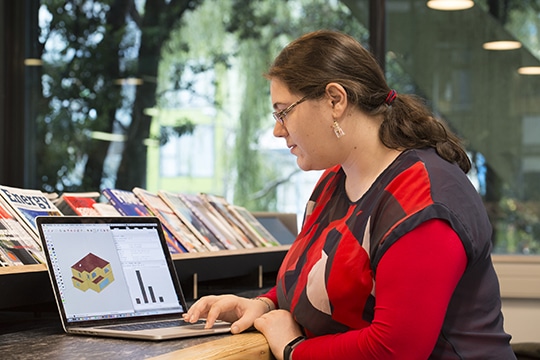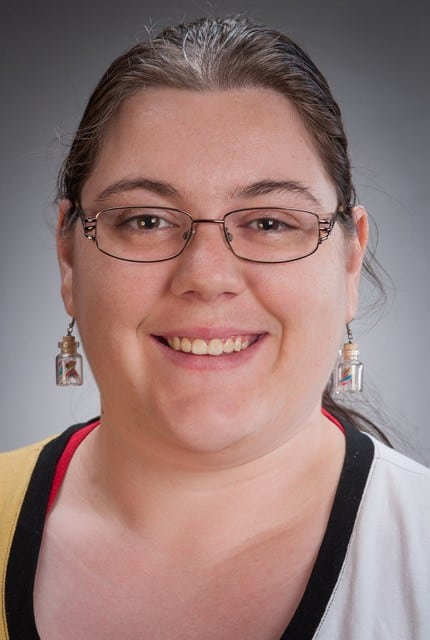23 November 2018 – Like many on the autism spectrum, high school was not a great experience for Beth Noble. Despite this, she always wanted to go to university and continue to learn.
I LOVE LEARNING but have always struggled significantly with the social rules and expectations of my peers, which resulted in a lot of stress and affected my exam results at secondary school.
The journey at university has not always been ‘smooth sailing’; there have been lots of up and downs over the years.
It has taken time and work to learn to balance academic commitments with social activities and personal time.
Today, I’ve now spent longer at university than I did in high school, completing both a Bachelor’s degree and a Master’s degree, and I have just committed to another three to four years of academic pursuit for a Doctoral degree (PhD).
I have rediscovered my love of learning, and found a place amongst peers who understand me – people who celebrate my strengths while working with my weaknesses.
Not only have I completed my qualifications, but in recent years I have also begun tutoring new undergraduates coming through the building science programme and working as a research assistant on projects with the lecturers – giving me some work experience alongside my academic progress.
I’m not sure what I’m going to do once I complete my PhD, I’m keeping my mind open, but am currently leaning towards a career in academia or research. It is by coming to university that I have found my place, and by sharing a few of my experiences, and things I have learnt over the years, I hope to help others find their place.
Starting university
When deciding if tertiary education is the path you want to follow, remember academic performance at high school does not necessarily predict performance at university or polytechnic.
My high school results were well below what I was capable of achieving, only just meeting the guaranteed entry requirements into the School of Architecture.
While there are some choices in what you study at high school, at university you can choose your programme, courses and subjects, and align them to your interests.
Some papers may be compulsory early on, but at higher levels you truly get to decide where your interests lie and decide what you want to learn. At university, I became an A-grade student overnight, almost purely from the more specific environment that held my interest.
Choosing a place to study that will be the best fit is complex – but a really important decision. A lot of factors should influence your choice of tertiary institution. Decide whether a university or a polytechnic environment would work best for you. Research what courses and papers are available to you at different institutions, and what qualification you will gain. What support does the institution provide to students – learning, health, disability, academic etc. Consider whether you want to go to a local institution, or one further away from home.
Your choice of institution will also inform your living arrangements. Consider carefully whether you want to move away from home. The move from high school to university is a massive change in environment.

The following year, my official first year, I changed to the university offering the course I wanted to study. It was in another city, so the year was spent in a Hall of Residence, which is an experience I regret – socially, physically and mentally. At the end of first year, as my parents had relocated closer to where I was studying, I moved back home. It took another five years, until I was 24, to get up the skills and courage to leave home again and live independently.
Getting support
You don’t have to study full-time at university, there’s a lot of flexibility in how you study. I’m a big proponent of “limited full-time” study – where you have a part-time workload, but are considered a full-time student in the eyes of StudyLink and the university.
It took me four years to complete my three-year Bachelors degree, taking two or three courses each semester instead of the typical four. I used to say that I considered that I had full time commitments, three quarters of this was formal study, and the other quarter was other activities that I participated in to keep up my mental health but still took energy – volunteering, social, etc. I was then able to also have some downtime, which was essential for me to cope and to succeed.
It is important to include academia, extracurricular and personal time, and “limited full-time” study enabled me to have all three components of university life.
University does require significant self-motivation and planning skills. Unlike school, there is nobody who is keeping an eye on you making sure that you are going to class or understanding the content or handing in assignments. However, there are support services in place that can help you with this if it is an area you struggle with.
Disability Services are a lifesaver. Even if you don’t identify as “disabled”, they’re a fantastic resource. In the eyes of the university, they are the service that helps anyone who has extra needs – whether that be because of a physical disability, a neurological difference, a learning difficulty, or even just
a broken arm. They can help you with all kinds of things, including finding your way around the university, note taking, adaptive technology, quiet areas, test/exam arrangements, and more.
Also, don’t be put off from going to them if you had bad experiences at school with support services such as through the Ministry of Education or the New Zealand Qualifications Authority (NZQA).
I still remember going into Disability Services for the first time at university to organise arrangements to take my exam in a separate room. My advisor filled out the form with me, we both signed it, they scanned it into the computer, and I asked when I would find our whether it was approved. Their answer – “Oh, no, I’ve approved it now, it’s all sorted”.
In my experience, they genuinely want to be as helpful as they possibly can and help every student succeed. There are also lots of other services, including learning/academic support, who can provide assistance with skills like writing, research, statistics, revision, and more, in both workshops and one-on-one assistance.
Get to know the staff in your courses. This can be a little difficult in first year, as the courses are often very large, but if you’re registered with Disability Services they will often be able to help introduce you. It’s always a good idea to have introduced yourself to the staff early
in the term, as if you need assistance or an extension later they are already familiar with your name. The staff in your courses or programme can be some of your greatest advocates, particularly if you are part of a small programme.
Unlike high school you are not strictly required to attend all your classes, but doing so is not only is good academically, you can make a good impression by attending classes. Staff know which students are coming to class and which they have never seen. And staff are more willing to help or hear from students that they see regularly in their classes, even if they don’t know you by name.
If you attend all your classes, barring illness or legitimate absence, it is very difficult to fail. Also, read the marking criteria for your assignments carefully. These lay out exactly what you are going to be marked on, and if you can tick off every item on the list, again, it is very difficult to fail.
Finding your place
One of the great things about university is that you aren’t lumped into a classroom with a group of people based often solely on the date of your birthday. University has a very diverse range of people – ages, interests, beliefs, and more. There are many ways to meet new acquaintances and make friends. First year classes aren’t always the best place for this, as they are often very large and can be quite isolating for someone on the autism spectrum, but there are other ways.
Clubs are a fantastic way to meet others who hold similar interests or demographics as you. In my first year, a student a few years above me in a different course started up a representative group for students with disabilities. I attended the first meeting as I’d heard about it from an advisor, and ended up working on the executive for the next four years – first as the secretary, and then as president. I made a group of friends out of this that I still see regularly – despite most having well and truly finished university and being out working now. I think the best part about this group is that we all had some kind of disability or difference, and therefore had a lot in common. We are very diverse, but all have the common experience of moving through the world with additional needs and facing barriers of different kinds.
Outside of university, taking up volunteering opportunities was also a way to meet social needs. I found it a great way to meet new people, in a scheduled setting, but still have a purpose and not be solely required to make social small talk. Today, as a postgraduate student, I also have a relationship with the lecturers and teaching staff that is closer to that of colleagues than superiors. I have had, and still have, fantastic supervisors for my thesis and other research projects I’ve been a part of.
Personally, even as I excelled academically, I still found undergraduate somewhat difficult socially – though it was significantly better than high school. While I made some friends outside my programme through clubs and volunteering, I truly started to get along with my peers once I entered postgraduate study. We went from classes of 60-250 students to just 10, working together with an assigned space, and we became a cohort that provided great support to each other.
Overall, it can take time to find your place at university. University is a place that has a diverse range of both academic experiences and social opportunities. I hope that some of the stories and advice here can help current and future students find their individual places as well.
- Beth Noble (BBSc, MBSc) is a young adult on the autism spectrum, who has just started her PhD in Building Science
- Meet Beth Noble
- Part of a community




